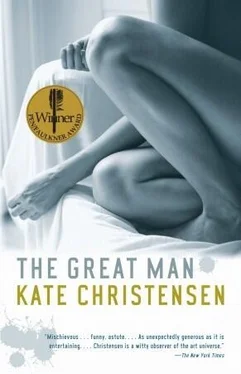Maxine looked up and down the long, crowded room. Jane Fleming was a small, pale moth of a woman, or at least she appeared so initially, until you got to know her; she could easily go unnoticed among these forty-plus guests, but Paula Jabar’s ostentatious coppery dreadlocks would have attracted the notice of everyone in the place within twenty seconds. So either Paula hadn’t arrived yet or she wasn’t planning to show. Maxine felt simultaneous twinges of anticipation and disappointment; she disapproved of Paula and her work and everything she said and stood for, but at least she could hardly be called boring, and boredom was Maxine’s bugbear.
“There you are!” came Jane’s familiar voice over her left shoulder.
“We’re both midgets,” said Maxine, turning to smile at her. “If just one of us were taller, I’m sure we’d have seen each other an hour ago.”
Jane kissed Maxine’s cheek and looked into her face with an open, steady, unblinking expression.
“I look like crap, I know,” said Maxine. “But don’t forget I’m eighty-four.”
“I’ve missed you, Maxine,” said Jane.
“You have?”
“Well, yes.” There was a very brief pause, with many unsaid things hanging in it. “I know I could have called you,” Jane went on, “but it wasn’t that kind of missing; it was the kind where I wanted to run into you at a party.”
“And here we are.”
Their affair had begun and ended remarkably civilly at the end of the summer of 1978. After several months of extremely good sex (great sex, really; Jane was hotly sensual, uninhibited as a dolphin; not only did she laugh a lot in bed but she had a way of taking Maxine’s nubbin, as they called it as a private joke, between her lips with a vacuum suck and mashing it with exactly the right amount of pressure with her tongue and then backing off at precisely the right instant, thereby giving Maxine orgasms the transcendent, intense likes of which she’d never known before or since) and interesting conversations and mutual respect and all that, they had agreed that they liked each other, but they weren’t in love, and they were much too busy with their careers, both of them, to see each other so often if it wasn’t going to be a grand lifelong passion. But something had always rankled a little about this for Maxine: She’d half-suspected, whenever she’d thought about it later, that they’d let each other off too easily. They were a lot alike, which was part of their mutual attraction — equally driven, reserved, proud, independent, determined not to need anything from anyone. The trouble was, any lengthy love affair required at least one participant who was willing to be the fool, and ideally two; maybe the real problem had been that neither was willing to fall, to lose control. So they had let each other go.
Maxine, twenty-three years older than Jane, had been in the throes of what she’d half-mockingly called her “midlife crisis” that summer, so she was acutely aware that her pursuit of a much younger woman might mean she was a desperate, aging dyke. It was anyone’s guess why Jane had put her cards down and left the table, but in hindsight, Maxine sometimes wondered whether it was a similarly misguided pride. Back then, Jane was thirty-three and still working on her Ph.D. thesis, whereas Maxine was enjoying the beginnings of her professional heyday, a sudden, inexplicable ten-year-long interest in her work that translated into articles and interviews and a rash of sales that, thanks to shrewd and timely investments and frugal habits, might last the rest of her life.
“How have you been?” Jane asked.
“I have a new assistant,” said Maxine. “She’s a young painter, Hungarian, very talented, and she came to me out of nowhere and offered to work for me for almost nothing. Now I don’t know what the hell I ever did without her.”
“I see,” said Jane.
“How have you been?”
“Oh,” said Jane. “Well. I’m dating someone new these days, a colleague for a change. Also for a change, a man,” she added. “I wanted to bring him tonight, but he couldn’t make it.”
Maxine tried not to show how shocked she was by this. And something else besides shock, something more personal. “I hope he’s nice.”
“Oh, very nice,” Jane replied with a sly sidelong look no doubt meant to convey something erotic.
“Well, I’m happy for you,” said Maxine. “Listen, there are two different guys writing books about Oscar right now.”
“Good for him,” said Jane with some skepticism; she had barely known him, but even so, she had never thought much of Oscar, either as an artist or as a person.
“Just in case they contact you,” said Maxine. “Don’t say a word about that bet.”
“They would never in five million years contact me, because I hardly knew the guy,” said Jane. “But, Maxine, nothing would give me greater pleasure than to see the truth get out about all that.”
Maxine smiled. “Between you and me and the place cards, I feel the same way, but I have a good reason to want to keep it a secret.”
“Well, it must be a very good reason, that’s all I can say,” said Jane.
Before Maxine could reply, Michael bore down on them with two men in tow.
“Maxine Feldman, I’d like you to meet two of your collectors!” he said. “This is Saul Unger, and this is his partner, John Sipperley.”
“We love our new one,” said Saul Unger, the shorter, older, uglier, and no doubt richer of the pair.
“And we’ve given it a prime spot over our fireplace,” said John Sipperley, who was probably in his early fifties but was still willowy and elfish — he looked like a ballet dancer turned choreographer.
They all took their places at the table. Maxine’s previously unknown collectors flanked her. She felt very grateful to Michael and Natalie for putting her between them, essentially giving her their ears, the opportunity to sell them new work over the course of a friendly dinner.
“Where do you live?” she asked John.
“In New Canaan,” he replied. “We bought an old barn and moved into it.”
“I bet it’s beautiful,” said Maxine.
“It’s all right,” said John.
“Of course it’s beautiful.” Saul leaned across Maxine to say this sternly to John. “John designed the whole place.”
“You’re an architect?”
“No,” said John with puckish apology, “just an amateur decorator. He talks me up too much.”
Waiters set down bowls of vegetal consommé with tiny bits of green, algae probably, floating on top. Maxine took a spoonful, thinking as she did so that this was the kind of food invalids were given when they were almost dead, either to bring them back from the brink or to sustain them on their journey to the underworld.
Across the table, Jane and Michael were discussing Paula: Where could she be? Why hadn’t she come?
“Michael tells us you have a new series under way,” John said to Maxine with what looked to her to be genuine interest. “What’s it like?”
“I’m obsessively preoccupied with mortality lately,” Maxine said after a slight pause. “I’d be silly if I weren’t, at my age. It’s a few lines here, some brush strokes there, a lot of bare white canvas. Philip Larkin has a great poem about getting old and dying called ‘The Old Fools,’ but I promise I won’t bore you by quoting from it. It’s about how old people are protected from the constant, crazy-making terror of death by an emotional trompe l’oeil; otherwise, we’d all be bonkers. I’m trying to remove that illusory perspective, show what it looks like when you force yourself to see where it’s all going to end up.”
“I love it,” said John.
“I’d like to see them,” said Saul.
Читать дальше












